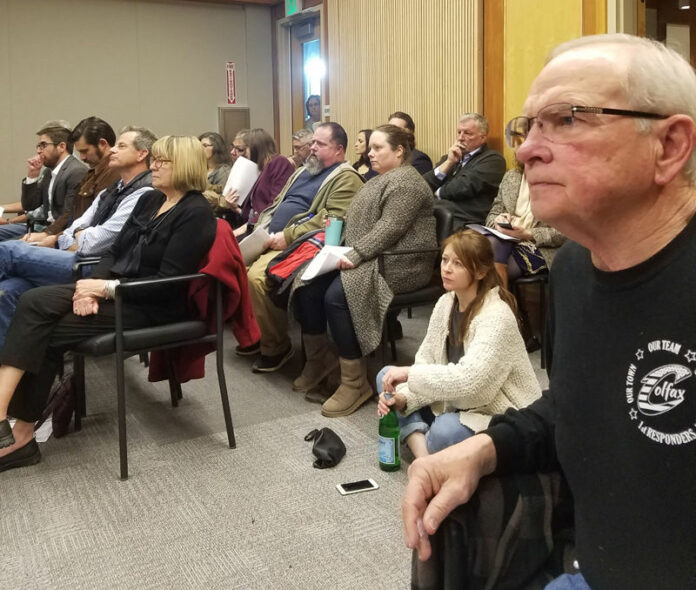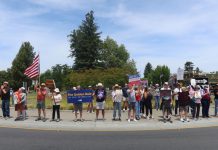It was another packed house for affordable housing at the Feb. 19 Healdsburg City Council meeting.
The meeting covered a broad swath of housing issues facing the city. Members of the public came up to speak during the Community Housing Commission’s (CHC) report to the city. The report detailed several directions the city could pursue as to how it tackles affordable housing.
Later on, the city moved to put a relocation assistance urgency ordinance on the agenda for its next meeting.
After that, council accepted a report showing the need for a study on what kind and how many affordable units could be built on three city-owned sites: 3 North St., 155 Dry Creek Rd. and Saggio Hills. The findings are expected to be presented in four to six months.
The CHC public comment period was filled with both members of the general public as well as CHC members. One of the suggestions for direction to staff was that CHC, which has not met in half a year, would be put on an as-needed basis instead of having regular meetings. Members of CHC said that members had not complained about being overworked.
“As-needed sends a horrific message to the community,” one CHC member said, as fewer meetings could be seen as not having affordable housing as a priority.
A more aggressive plan was needed, as some members from last week’s packed house returned to say. Also from the CHC report, direction was given to staff to increase the size limit on accessory dwelling units (ADU) as well as looking at ways to reduce fees associated with building or creating an ADU without triggering prevailing wage.
Prevailing wage is a set wage that can be forced on a builder to pay when other fees are not involved with the cost to the owner/builder and can be as much as a 30 percent increase in labor costs.
Members of the public were generally happy about this, though there was still concern that building ADUs would not create sufficient affordable housing stock. Santa Rosa’s ADU statutes were shown as an example of fee reduction.
The public also wanted to ensure in-lieu fees for affordable housing were efficiently and quickly spent on building new projects.
One of the issues in CHC’s report Mayor David Hagele wanted to prioritize for ADUs was the permit process. He noted that many of the builders of ADUs are homeowners and not developers, and he wanted to make sure there was clear language for those wanting to build so they would not be frustrated in their attempts.
Several members of the public echoed this statement, saying that they and their neighbors felt they couldn’t wrap their heads around the intricate process of building in town.
“We’re too restricted,” one woman said at the podium.
In terms of total suspension of fees for ADUs, Vice Mayor Leah Gold said a blanket suspension would let ADUs not intended as housing get the same relief as housing units, which is not the intent she has.
Councilmember Shaun McCaffery said that though this is a possible problem, ADUs can also switch purposes throughout their lifespan, and noted what once was a pool room could turn into a rental unit years down the road.
In the end, council directed staff to explore options as to where council could draw the line in the sand.
Urgency ordinance
In two weeks, council will likely vote on an ordinance that it unanimously wanted put on the agenda as an urgency ordinance.
The relocation assistance law would take effect immediately and would have about a year for council to revise. The ordinance would allow those who see an increase to their rent or who face eviction to receive money to be able to find a new place to live, as relocation costs can be prohibitive, often first and last month’s rent plus a security deposit.
Hagele again brought up his personal relation to the issue, having been evicted from his rental without a solid plan to move in place. He said one of the challenges for him politically was to “listen with my heart and vote with my head.”
Renters could receive assistance after rent is increased over a certain point. Though the trigger could change, the rate of increase shown in the city’s report was 10 percent per year.
Renters would also be able to collect assistance if they were evicted, though the reasons behind the eviction would affect the decision and there would be protections in place for the landlord so necessary upgrades or other urgent items could be addressed in a vacant home.
Those who would qualify for the assistance would also have to have at least paid a certain amount in rent already before the increase would be counted as a trigger. This way, someone who pays considerably lower than market price would not qualify for assistance because the rental was brought into parity with the market.
Council directed staff to find an average rent price suitable for Healdsburg, and not Sonoma County in general. This way the number would reflect what it would take to find another place in the city, which is one of the more expensive areas to live in the county. The fair market value for the county that was presented to the board was at $1,447 per month for a one-bedroom home.
The assistance would not be able to cover a single family residence due to legal concerns, and would only apply to multi-family units. Council did direct staff to explore what options single-family homes could have if the ordinance passes, however, and may try to include them later as it revises the ordinance.
There would be a 12-month minimum residency requirement at a rental in order to qualify for the program. It would cover roughly three months of the fair market value rent figured for the city.
Though the topic of rent control came up from the public, this assistance is not a form of it. Residents facing higher rents can choose to pay those rents and stay and landlords will still have the ability to raise rents at their discretion, but if the ordinance passes, the additional cost to the landlord in fees to the city to then go to the tenant would be considered.
The city will also likely explore whether or not it can retroactively apply this assistance as well, particularly for the tenants in a multi-family unit on Piper Street.
At council’s last meeting, the non-agenda call to the public was packed as residents and neighbors expressed their frustration and concern as everyone in the apartment was evicted with a 90-day notice, and many feared they would have to leave a town they lived in for decades.
Council’s next meeting is tentatively on March 4, normally held at 6 p.m. at city hall located at 401 Grove St.









